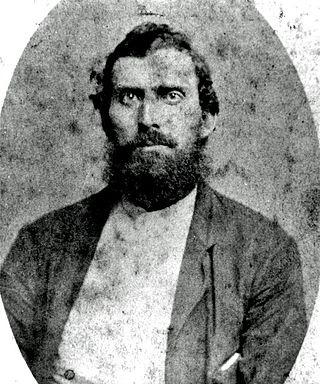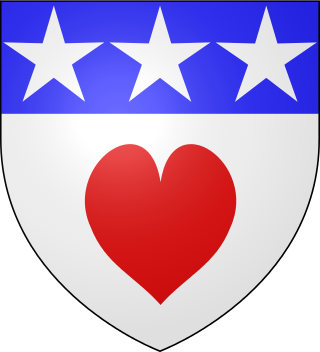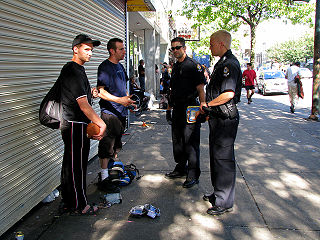Related Research Articles
In law, possession is the control a person intentionally exercises toward a thing. Like ownership, the possession of anything is commonly regulated under the property law of a jurisdiction. In all cases, to possess something, a person must have an intention to possess it as well as access to it and control over it. A person may be in possession of some piece of property without being its owner.

Theft is the act of taking another person's property or services without that person's permission or consent with the intent to deprive the rightful owner of it. The word theft is also used as a synonym or informal shorthand term for some crimes against property, such as larceny, robbery, embezzlement, extortion, blackmail, or receiving stolen property. In some jurisdictions, theft is considered to be synonymous with larceny, while in others, theft is defined more narrowly. A person who engages in theft is known as a thief.

Black's Law Dictionary is the most frequently used legal dictionary in the United States. Henry Campbell Black (1860–1927) was the author of the first two editions of the dictionary.
Larceny is a crime involving the unlawful taking or theft of the personal property of another person or business. It was an offence under the common law of England and became an offence in jurisdictions which incorporated the common law of England into their own law, where in many cases it remains in force.

An outlaw, in its original and legal meaning, is a person declared as outside the protection of the law. In pre-modern societies, all legal protection was withdrawn from the criminal, so anyone was legally empowered to persecute or kill them. Outlawry was thus one of the harshest penalties in the legal system. In early Germanic law, the death penalty is conspicuously absent, and outlawing is the most extreme punishment, presumably amounting to a death sentence in practice. The concept is known from Roman law, as the status of homo sacer, and persisted throughout the Middle Ages.

The Theft Act 1968 is an act of the Parliament of the United Kingdom. It creates a number of offences against property in England and Wales.

Jonathan Wild, also spelled Wilde, was an English thief-taker and a major figure in London's criminal underworld, notable for operating on both sides of the law, posing as a public-spirited vigilante entitled the "Thief-Taker General". He simultaneously ran a significant criminal empire, and used his crimefighting role to remove rivals and launder the proceeds of his own crimes.
In tort law, detinue is an action to recover for the wrongful taking of personal property. It is initiated by an individual who claims to have a greater right to their immediate possession than the current possessor. For an action in detinue to succeed, a claimant must first prove that he had better right to possession of the chattel than the defendant, and second, that the defendant refused to return the chattel once demanded by the claimant.

Henry of Bracton, also known as Henry de Bracton, Henricus Bracton, Henry Bratton, and Henry Bretton, was an English cleric and jurist.

This page is concerned with the holders of the forfeit title Earl of Douglas and the preceding feudal barons of Douglas, South Lanarkshire. The title was created in the Peerage of Scotland in 1358 for William Douglas, 1st Earl of Douglas, son of Sir Archibald Douglas, Guardian of Scotland. The Earldom was forfeited by James Douglas, 9th Earl of Douglas, in 1455.
A fieri facias, usually abbreviated fi. fa., is a writ of execution after judgment obtained in a legal action for debt or damages for the sheriff to levy on goods of the judgment debtor.

A fence, also known as a receiver, mover, or moving man, is an individual who knowingly buys stolen goods in order to later resell them for profit. The fence acts as a middleman between thieves and the eventual buyers of stolen goods who may not be aware that the goods are stolen.

It Takes a Thief is an American reality television series that originally aired on the Discovery Channel from February 2, 2005, to April 13, 2007. The program stars and is hosted by Matt Johnston and Jon Douglas Rainey, two former thieves who use their unique expertise to teach people in an unusual way to protect their properties.
Charles Hitchen, also mentioned as Charles Hitchin in other sources, was an English thief-taker and under-marshal of the City of London in the early 18th century, also, famously tried for homosexual acts and sodomy offences. Alongside his former assistant and then a major rival Jonathan Wild, against whom he later published a pamphlet and contributed to his sentencing to death, Hitchen blackmailed and bribed people and establishments irrespective of their reputation, suspicious or respectable. Despite the disgrace of the people he earned through his abusive exercising of his power, he remained in power and continued fighting against violent crime, especially after the ending of the war of the Spanish Succession and until 1727.

Possession of stolen goods is a crime in which an individual has bought, been given, or acquired stolen goods.

The Halifax Gibbet was an early guillotine used in the town of Halifax, West Yorkshire, England. Estimated to have been installed during the 16th century, it was used as an alternative to beheading by axe or sword. Halifax was once part of the Manor of Wakefield, where ancient custom and law gave the Lord of the Manor the authority to execute summarily by decapitation any thief caught with stolen goods to the value of 131⁄2d or more, or who confessed to having stolen goods of at least that value. Decapitation was a fairly common method of execution in England, but Halifax was unusual in two respects: it employed a guillotine-like machine that appears to have been unique in the country, and it continued to decapitate petty criminals until the mid-17th century.

In English legal history, a thief-taker was a private individual hired to capture criminals. The widespread establishment of professional police in England did not occur until the 19th century. With the rising crime rate and newspapers to bring this to the attention of the public, thief-takers arose to partially fill the void in bringing criminals to justice. These were private individuals much like bounty hunters. However, thief-takers were usually hired by crime victims, while bounty hunters were paid by bail bondsmen to catch fugitives who skipped their court appearances and hence forfeited their bail. Both types also collected bounties offered by the authorities.
In philosophy, a quality is an attribute or a property characteristic of an object. In contemporary philosophy the idea of qualities, and especially how to distinguish certain kinds of qualities from one another, remains controversial.
Infangthief and outfangthief were privileges granted to feudal lords under Anglo-Saxon law by the kings of England. They permitted their bearers to execute summary justice on thieves within the borders of their own manors or fiefs.
Furtum was a delict of Roman law comparable to the modern offence of theft despite being a civil and not criminal wrong. In the classical law and later, it denoted the contrectatio ("handling") of most types of property with a particular sort of intention – fraud and in the later law, a view to gain. It is unclear whether a view to gain was always required or added later, and, if the latter, when. This meant that the owner did not consent, although Justinian broadened this in at least one case. The law of furtum protected a variety of property interests, but not land, things without an owner, or types of state or religious things. An owner could commit theft by taking his things back in certain circumstances, as could a borrower or similar user through misuse.
References
- ↑ Bracton de Legibus et Consuetudinibus Angliæ 1, 3, tr. 2, c. 32.
- ↑ Henry C. Black, Black's Law Dictionary, 4th ed. 1968; see also 7th ed.
- ↑ John Bouvier, A Law Dictionary, Adapted to the Constitution and Laws of the United States of America, J. B. Lippincott & Co., Philadelphia, 15th ed., 1883.
- 1 2 3 Henry C. Black, Black's Law Dictionary, 4th ed. 1968.
- ↑ Laws of Henry I , chap. 59; Laws of Aethelstane, § 6; Fleta, lib. 1, chap. 38, § 1; Britton p. 72; DuCange, Handhabenda.